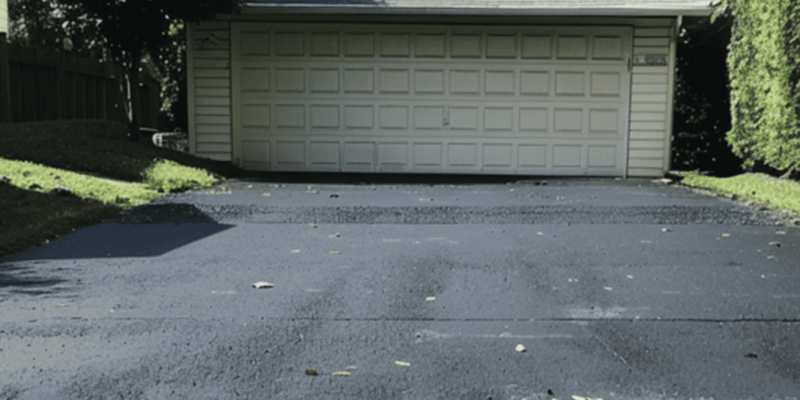Deciding between a concrete and asphalt driveway can be a big choice for homeowners. Both have their benefits, like cost savings or lasting a long time, but they also have drawbacks. This blog will help you understand the differences, covering costs, how long they last, upkeep, looks, and how they impact the environment. By the end, you’ll be better equipped to pick the right driveway for your home.
Overview of Concrete and Asphalt Driveways
Concrete Driveways: Composition and Characteristics
Concrete driveways are made from a mix of cement, water, and aggregates like sand or gravel. This combination makes them strong and able to last for many years, often over 30 with proper care. Concrete is also great for those who want a unique look, as it can be colored or stamped to create different designs.
Asphalt Driveways: Composition and Characteristics
Asphalt, on the other hand, is made from a mix of crude oil byproducts and small stones. It’s known for being less expensive upfront and is quicker to install. Asphalt driveways are black, which helps them melt snow faster in the winter. They need a bit more upkeep than concrete, with resealing required every few years, but repairs are usually simpler and cheaper.
Initial Cost and Long-Term Investment
Upfront Costs
When it comes to the initial installation, asphalt driveways generally cost less than concrete. This makes asphalt a good choice for homeowners looking to save money right away. However, the price can vary based on the size of your driveway and where you live.
Longevity and Maintenance Costs
While asphalt might be cheaper at first, concrete driveways usually offer a better value over time. They last longer, with fewer repairs needed. Asphalt driveways might need more frequent touch-ups, which can add up. So, when thinking about cost, consider how long you plan to stay in your home and how much you might spend on keeping your driveway in good shape.
Professional Services
To ensure quality and durability, it’s crucial to hire professional contractors for driveway installation and maintenance.
Durability and Performance in Various Climates
Concrete’s Performance
Concrete is tough and can handle a lot of weight, making it a great choice for areas with heavy vehicles. It does well in many climates, especially where it gets very cold, as it’s less likely to crack from the freeze-thaw cycles than asphalt. However, it can be damaged by salt used to melt ice, so it’s something to think about if you live in a snowy area.
Asphalt’s Performance
Asphalt’s flexibility helps it resist cracking in cold weather, but it can get soft and sticky in really hot temperatures. This means it might not be the best choice in areas that see extreme heat. Asphalt can also develop ruts and depressions over time, especially in places where vehicles sit for a long time.
Maintenance and Repair: What Owners Should Expect
Maintaining a Concrete Driveway
Taking care of a concrete driveway is pretty straightforward. You’ll need to clean it regularly and seal it every few years to keep it looking good and to prevent stains from oil or other spills. If a crack does appear, fixing it quickly can stop it from getting worse. While concrete is tough, fixing big cracks or damage can be costly because it’s harder to match the original look.
Maintaining an Asphalt Driveway
Asphalt driveways need a bit more attention to stay in top shape. They should be resealed every two to three years to keep them strong and looking fresh. This sealing helps protect against water damage and cracks. If holes or cracks do show up, they’re usually easier and cheaper to fix than concrete. Regular maintenance can help an asphalt driveway last around 20 years.
Aesthetic and Design Considerations
Design Flexibility of Concrete
One of the big pluses of concrete is its versatility in design. Homeowners can choose from many colors, patterns, and textures to create a unique look. Whether you want a driveway that looks like natural stone or something with a modern flair, concrete can be customized to match your home’s style.
Asphalt’s Aesthetic
Asphalt driveways have a more uniform appearance. They’re always black, which can work well for many homes but doesn’t offer much room for customization. However, the sleek, dark look of asphalt is ideal for those who prefer a simple, clean appearance that blends in with the road.
Environmental Impact and Sustainability
Concrete’s Sustainability Features
Concrete is a strong material that doesn’t need to be replaced often, which is good for the planet. However, making concrete requires a lot of energy and resources. On the bright side, concrete can be made to let water through, which helps prevent runoff and flooding. Some types of concrete can even clean the air by breaking down pollutants.
Asphalt’s Environmental Considerations
Asphalt is praised for being recyclable; old asphalt can be ground up and reused, which reduces waste. It’s also better at absorbing heat, which can help melt snow quicker in colder climates. Yet, this heat absorption can contribute to the “heat island” effect in cities, making them warmer.
Making the Decision: Factors to Consider
Budget Constraints
Think about both the immediate costs and the long-term expenses of maintaining and repairing your driveway. Asphalt is less expensive to install but may cost more over time in maintenance.
Climate and Usage
Your local climate and how you plan to use the driveway (like for heavy vehicles) should influence your choice. Each material performs differently under various conditions.
Aesthetic Preferences
Consider how the driveway will look with your home. Concrete offers more design flexibility, while asphalt provides a classic, uniform look.
Environmental Impact
Think about which material aligns with your environmental values, considering factors like recyclability, energy use in production, and effects on local ecosystems.
Concrete driveway vs asphalt FAQs
Which driveway lasts longer?
Concrete driveways usually last longer than asphalt if they’re taken care of. While asphalt might need more frequent repairs, concrete can go years without needing major work.
How does weather affect each type of driveway?
Concrete can crack in extreme cold if not sealed properly, while asphalt can soften in high heat. Both types have their climate strengths and weaknesses, so think about your local weather when choosing.
Can I customize the look of my asphalt or concrete driveway?
Concrete offers more options for customization in color, texture, and pattern. Asphalt is limited to its natural black color, but its smooth appearance has its own appeal.
What are the hidden costs?
Beyond the initial installation, consider the cost of maintenance, repairs, and eventual replacement. Concrete might have a higher upfront cost but lower maintenance costs, while asphalt is cheaper initially but may require more upkeep.
Conclusion
Choosing between a concrete and asphalt driveway involves balancing costs, durability, maintenance, design, and environmental impact. By considering your specific needs and preferences, you can select the material that best fits your home and lifestyle. Remember, the right choice is one that meets your long-term needs and aesthetic desires, offering the best value for your investment.

